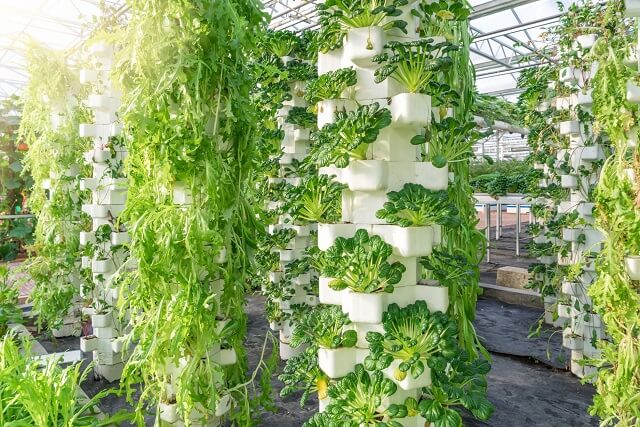SAUDI ARABIA BOOSTS VERTICAL FARMING SECTOR WITH AMBITIOUS €23.5 INVESTMENT
Saudi Arabia is following the lead of its neighbour the United Arab Emirates and is looking to invest heavily in vertical farming to help to improve food security.
Reports indicate that Saudi Arabia’s Ministry of Environment, Water and Agriculture is spending 100 million Saudi Riyals (€23.5 million) to promote vertical farming.
With vertical farming, layers of crops are grown one above the other, typically indoors in carefully controlled conditions using artificial light.
Yields per hectare are typically much higher than with conventional agriculture, although significant capital investment is needed to begin operations and energy demand can be high.
Vertical farms, which typically use hydroponic agriculture, where plants are grown in a nutrient-rich solution rather than soil, are seen as a way to increase food production in Saudi Arabia.
Such Increases are regarded as essential to satisfy demand for food from a population that has doubled in size in the past three decades and is continuing to grow rapidly.
An English-language newspaper, Arab News, recently reported that Saudi Arabia’s National Research and Development Centre for Sustainable Agriculture (Estidamah) is looking to develop partnerships with organisations involved in vertical farming.
In comments reported by the newspaper, Abdulrahman Al Soqeer, a member of Estidamah’s board and an academic at Qassim University in Saudi Arabia, said a major benefit of vertical farming was the small amount of space it required for a given yield.

This, he said, was particularly important amid population growth and the premium put on land by urban expansion. There were, he indicated, other benefits.
“A key advantage of vertical farming is the provision of a variety of agricultural products, particularly leafy vegetables and strawberries, in small areas and with less water and in an environmentally friendly manner,” he told the newspaper.
“Some crops can be produced in locations close to consumers, reducing the need to transport products through traditional means that increase pollutants in cities.”
In a further indication of the interest in vertical farming in Saudi Arabia, a vertical farming company called Kalera joined the US-Saudi Business Council in June last year.
Headquartered in Orlando in Florida, Kalera builds and runs vertical farms and was described by the US-Saudi Business Council as the largest company of its kind in the world.
“The company has rapidly expanded in the US and is planning to expand internationally, including in Saudi Arabia,” the council said last year.
The increased interest in vertical farming in Saudi Arabia mirrors the growth of the sector in the United Arab Emirates, which borders Saudi Arabia.

As reported by Sial Paris Newsroom in July, the UAE is setting up a new hydroponic farm at Dubai Industrial City as it too looks to improve food security.
Currently the Emirates imports about four-fifths of its food, but there are downsides to trying to achieve heavy increases in yields from conventional agriculture.
The UAE suffers from a shortage of freshwater and there are concerns that underground reserves in aquifers are being depleted as water is extracted for uses such as growing crops.
Also, under conventional systems, it would be difficult to produce many of the crops, such as melons, strawberries and kale, that can be grown using vertical farming.
In a statement released in mid-2021 when the new vertical farm was announced, Saud Abu Al Shawareb, the managing director of Dubai Industrial City, said the new facility would be “world class”.
“Food security is a national priority, and the expansion of technology-driven sustainable farming is vital to build and scale resilient production systems that can grow fresh and healthy produce,” he added.
The farm is being developed through an agreement signed with Sokovo, a Dubai-based firm specialising in vertical agriculture.
Join us at SIAL Paris as exhibitor Join us at SIAL Paris as visitor
